Washington establishment is shocked by election
- Published
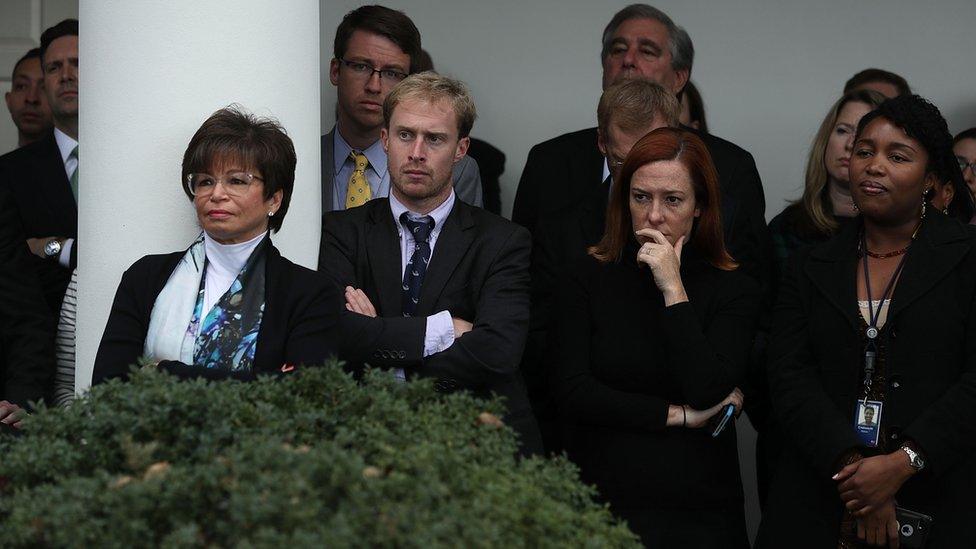
White House staff members gathered in the Rose Garden after the election to hear Obama speak
The election of Donald Trump has upended the Washington establishment. Think-tankers, analysts and others are now wondering: What will we do now?
David Simas, the director of the White House's office of political strategy, walked into the Rose Garden on Wednesday. He was chewing gum, just as he'd done while campaigning with the president earlier in the week.
Back then he looked jaunty.
Now he was waiting for President Obama to give a speech about President-elect Donald Trump. Mr Simas looked sombre.
Nearby Susan Rice, the president's national security advisor, spoke with a colleague. Josh Earnest, the White House press secretary, put his arm around a woman in tears.
Another White House staffer, a foreign-policy expert who's worked in Washington for years, straightened his tie. People around him - a burly, bearded man, a woman clutching two mobile phones - sobbed openly.
They embody the Obama administration - and, for many, the Washington establishment.
There was a time when they had a fresh vision of Washington: hope and change was the slogan of the Obama administration. "That's all gone," I said to a colleague in the garden.
But as he rightly pointed out: "There'll be change."
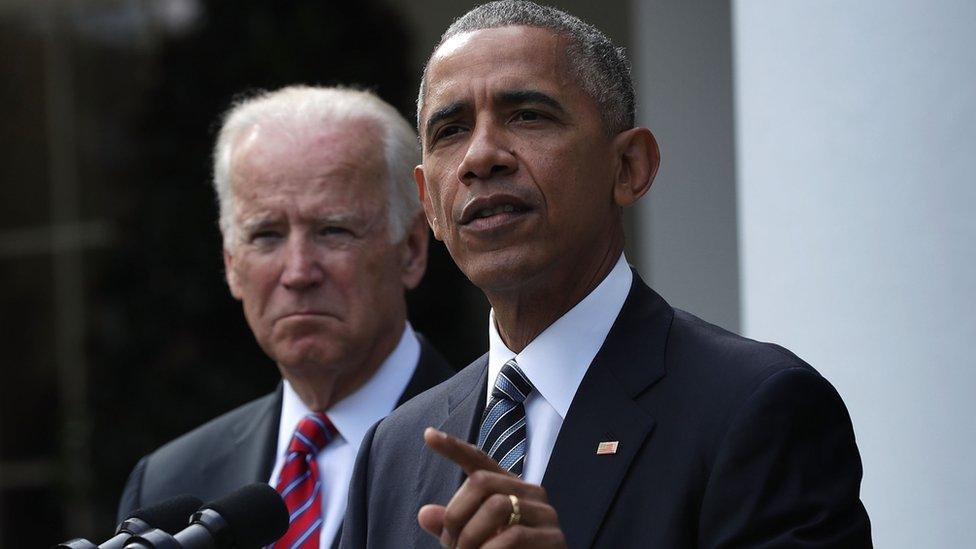
President Obama, shown with Vice-President Biden, told staffers about the transition
Mr Trump plans to upend Washington. He ran against the establishment, a group of insiders who work for the White House and on Capitol Hill, as well as in the media and for lobbying groups and think-tanks.
At a rally in Florida during his campaign, Trump issued a warning to "those who control the levers of power in Washington". He told people in the audience that the days of the Washington establishment would soon be over.
He said: "Our campaign represents a true existential threat like they haven't seen before."
He will now set up his own administration in Washington, one that promises to look very different from those that preceded it.
The men and women in the Rose Garden won't be part of it. They - like other members of the Washington establishment - will be replaced.
Candidates traditionally rail against the status quo in Washington, saying they'll shake things up. But the establishment is rarely trounced in such a dramatic manner.
Donald Trump is an outsider with no Washington experience. He does not have a vast team of advisers, people he's worked with for years in this town - nor does he want one.
No wonder those in the establishment are concerned. They're wondering what will happen to the country - and to them.
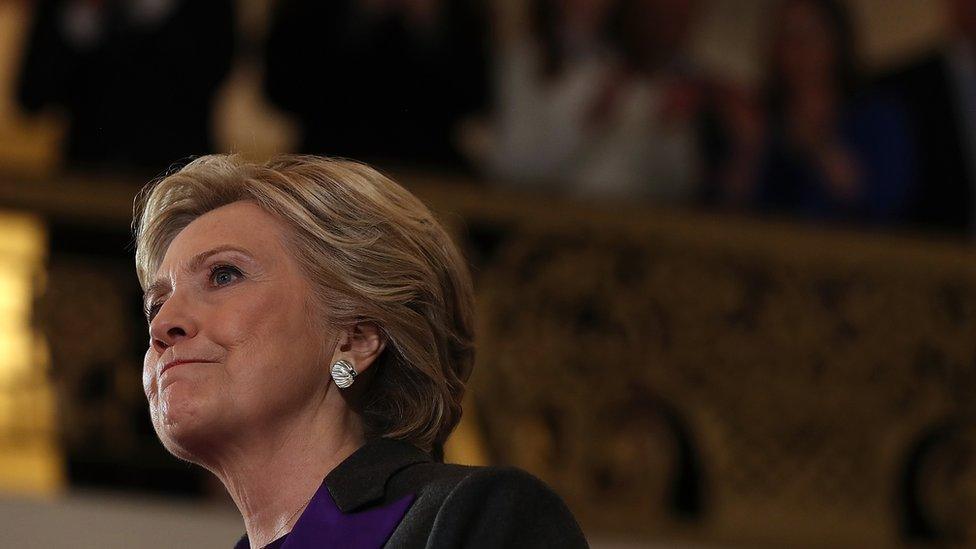
Hillary Clinton conceded defeat on Wednesday
I asked Bradley Graham, the co-owner of a Washington bookstore, Politics and Prose, the intellectual centre of the Washington establishment, to make sense of things.
"I'm not able at the moment to explain to myself, let alone your audience, what happened," he told me. "It's all so surreal, sad and scary."
Republicans were stunned, too. "Everyone made the wrong call," said Juleanna Glover, a Republican lobbyist. "I don't even think Trump thought he was going to win."
She and others had assumed that they knew the outcome of the election, weeks before it took place. Late on Tuesday, though, they started to wonder.
In my neighbourhood in northwest Washington, a place of narrow, tree-lined streets where congressmen, economists and other members of the establishment live, the lights were on in just about every house.
On a front stoop, a man sat hunched over a laptop, staring at the screen and smoking furiously. At another house, someone walked from room to room, looking at his phone, with his hand pressed against his forehead.
Gordon Adams, a former senior White House official, spoke with me after the election about the way that members of the Washington establishment - himself included - got things wrong. They were blinded by their own assumptions about the country and their role in it, he said.
"The capacity of the media and the chattering class to mystify itself is unlimited," he told me.
He described the way that Washington insiders underestimated the rage that people felt in other parts of the country. Now, Mr Adams said, the elite is trying to come to terms with reality: "They're shaken to the core."
Andrew Bacevich, the author of a book called Washington Rules: America's Path to Permanent War, said that the election laid bare uncomfortable truths. It showed how fed up people are with the Washington establishment - and also "by the unwillingness of those people in the establishment to recognise their anger".
Yet not everybody was upset by the election results. It was bright and sunny in downtown Washington on Wednesday morning. Strangely, it was raining at the same time.
Two men waited for a light on M Street. They had an establishment look (silver hair, navy jackets), and I asked them what would happen under Trump. I thought they'd be disturbed.
Their answer surprised me. Rather than sounding dismayed, they said they welcomed the change.
"Forget about the Washington establishment," one of the men said. He made a thumbs-up sign, saying: "All I can tell you is that."
Then he and his friend headed into McDonald's.
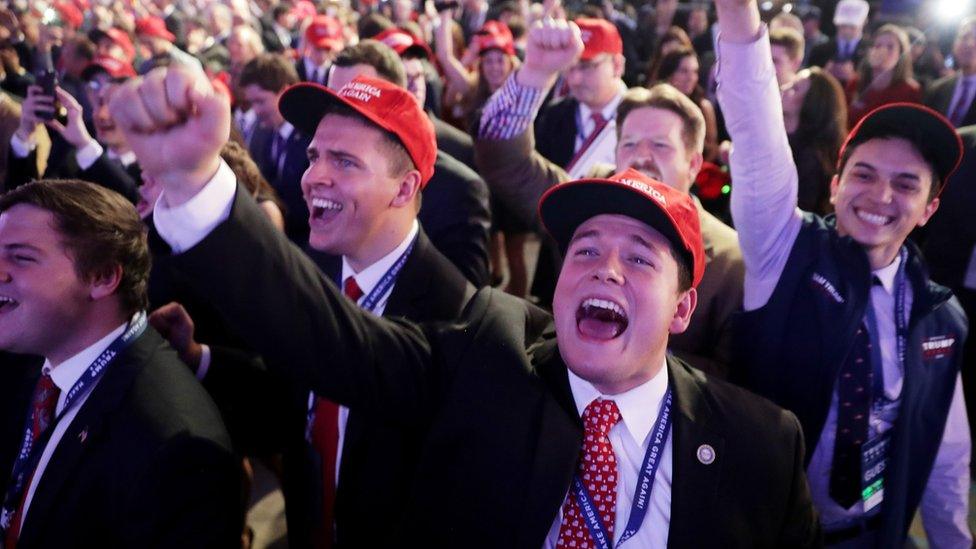
Trump supporters - shown in New York - railed against the establishment
Meanwhile members of the elite were in shock and tears. It won't last. Soon the jockeying and deal-making will begin - at least among some of the establishment leaders.
Some of those who once savaged Mr Trump are likely to start see things differently in a bit. They will start to wonder if there's a way for them to advise his cabinet or even to get a job in the White House.
As Mr Bacevich explained: "Like any establishment, this establishment is committed to its own self-perpetuation."
Mr Adams agreed.
"The Gucci-loafer crowd will survive. They'll find a way to work their way back in," he said. "I am much more worried about those Trump savaged on his way to the top - the women, the African-Americans, the Latinos, the disabled."
He said: "What happens to them?" For that, he said, he didn't have an answer.
- Published9 November 2016
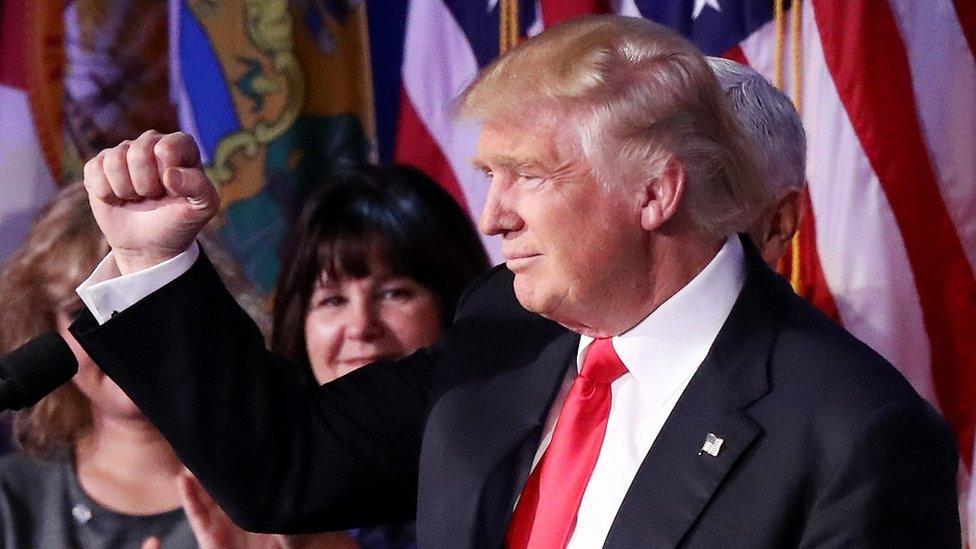
- Published9 November 2016